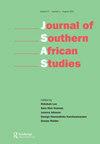Migration and the politics of the everyday: the Malawian experience in Southern Rhodesia and Zimbabwe
IF 0.7
4区 社会学
Q2 AREA STUDIES
引用次数: 0
Abstract
African spirit world – and much more. With its irregular surfaces, At Ansha’s inevitably presents a few zones of shade. While the text offers evocative descriptions of mountains and forests, mentioning some of the plants that together with the Koran are the core ingredients of Ansha’s craft, no sustained discussion is provided of the healer’s relationship with the vegetal world. Here, non-humans are definitely cast in minor roles. A historically minded reader will wonder about the uneasy relationship between ethnography and biography, considering that Ansha’s life is presented in a patchy and non-linear manner (perhaps echoing her own spirit epistemology). And even though witchcraft is one of the major preoccupations of Ansha and her clients, it is not explicitly thematised and is at times reduced to an allegory of neoliberalism. Finally, for a book that makes so much of dialogue, Trentini spends little or no time discussing the idioms in which such interactions occurred, her level of proficiency in Emakhuwa and her translation strategies. These minor misgivings, though, do not detract in any way from the book’s manifold qualities. At Ansha’s is a thoughtful, engaging, empirically rich and delicately written ethnography. Any scholar of Mozambique, spirit possession and Islam will have much to learn from this carefully crafted gem.移民与日常政治:南罗得西亚和津巴布韦的马拉维经验
非洲精神世界——以及更多。由于其不规则的表面,安沙餐厅不可避免地呈现出一些阴影区域。虽然书中对山脉和森林进行了令人回味的描述,并提到了一些植物和《可兰经》是安莎治疗术的核心成分,但书中没有持续讨论这位治疗师与植物世界的关系。在这里,非人类肯定会扮演次要角色。一个有历史头脑的读者会想知道民族志和传记之间的不稳定关系,考虑到安莎的生活是以一种不连贯和非线性的方式呈现的(也许与她自己的精神认识论相呼应)。尽管巫术是安莎和她的客户的主要关注点之一,但它并没有明确的主题化,有时被简化为新自由主义的寓言。最后,对于一本大量对话的书来说,特伦蒂尼几乎没有花时间讨论发生这种互动的习语,她对埃玛库瓦语的熟练程度以及她的翻译策略。然而,这些小小的疑虑丝毫没有减损这本书的多种品质。《在安莎》是一本深思熟虑、引人入胜、经验丰富、文笔细腻的民族志。任何研究莫桑比克、灵魂附体和伊斯兰教的学者都会从这颗精心制作的宝石中学到很多东西。
本文章由计算机程序翻译,如有差异,请以英文原文为准。
求助全文
约1分钟内获得全文
求助全文
来源期刊

Journal of Southern African Studies
AREA STUDIES-
CiteScore
1.40
自引率
0.00%
发文量
73
期刊介绍:
The Journal of Southern African Studies is an international publication for work of high academic quality on issues of interest and concern in the region of Southern Africa. It aims at generating fresh scholarly enquiry and rigorous exposition in the many different disciplines of the social sciences and humanities, and periodically organises and supports conferences to this end, sometimes in the region. It seeks to encourage inter-disciplinary analysis, strong comparative perspectives and research that reflects new theoretical or methodological approaches. An active advisory board and an editor based in the region demonstrate our close ties with scholars there and our commitment to promoting research in the region.
 求助内容:
求助内容: 应助结果提醒方式:
应助结果提醒方式:


